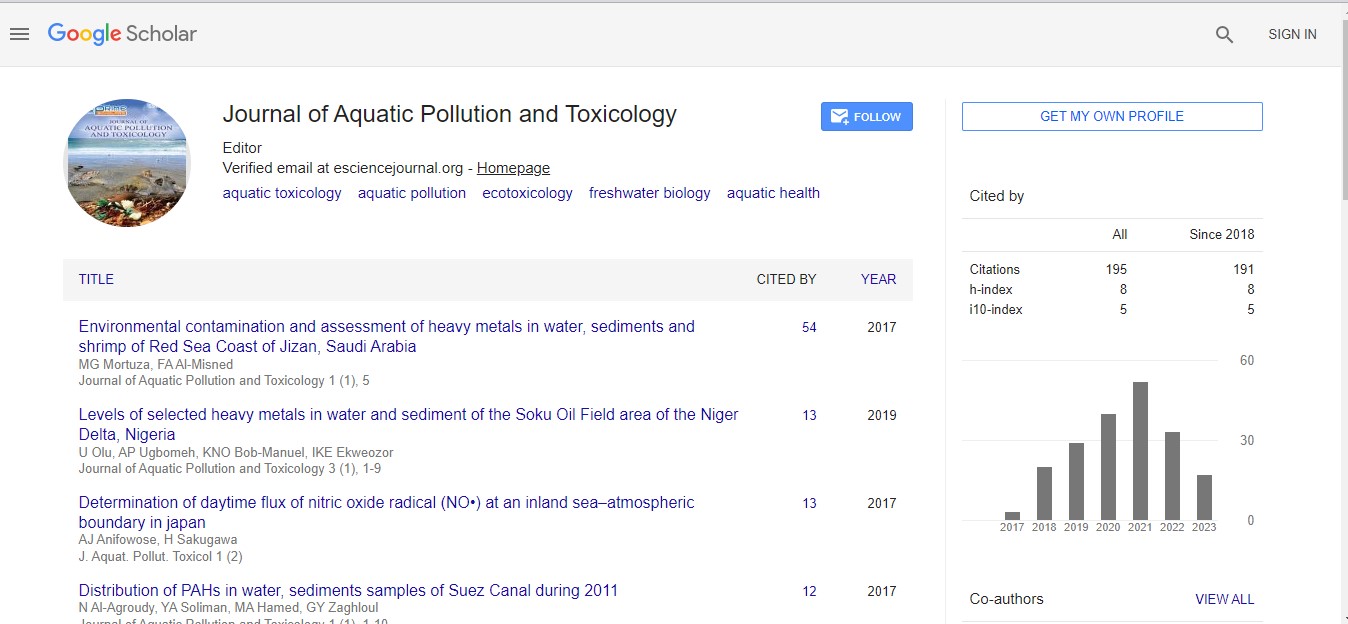Perspective - (2022) Volume 6, Issue 5
Environmental Impact of Petroleum Hydrocarbons with Low Boiling Point Compounds around Nigeria
Charles W. Knapp*
Department of Environmental Science, University of Strathclyde, Glasgow, Scotland, United Kingdom
*Correspondence:
Charles W. Knapp,
Department of Environmental Science, University of Strathclyde, Glasgow, Scotland,
United Kingdom,
Tel: 8541279630,
Email:
Received: 31-Aug-2022, Manuscript No. IPJAPT-22-14765;
Editor assigned: 02-Sep-2022, Pre QC No. IPJAPT-22-14765 (PQ);
Reviewed: 16-Sep-2022, QC No. IPJAPT-22-14765;
Revised: 21-Sep-2022, Manuscript No. IPJAPT-22-14765 (R);
Published:
28-Sep-2022, DOI: 10.21767/2581-804X-6.5.52
INTRODUCTION
The toxicity of gasoline hydrocarbons increases with the amount
of slightly effervescent mixtures and with increasing demand for
alkanes, alkenes, and aromatics. BTEX, an abbreviation for benzene,
toluene, ethylbenzene, and xylene isomers, is more harmful
to the climate than various hydrocarbons. They are the usual
aromatic mixtures of unrefined petroleum, are generally soluble,
are generally wearable, and have a pronounced effect due to
their physical and compositional properties. Saturating the soil
and groundwater offers a very blissful opportunity. It has been
mandated by USEPA and Climate Canada as an unsafe, carcinogenic
and psychotic compound. Analysts in the field of toxicology
certainly stand out from unpredictable natural mixtures (VOCs)
like BTEX given the associated health risks. A healthy climate is
the basis for the existence of life. Life expectancy in climates lacking
natural features is usually short. Airborne and waterborne
diseases, typically associated with climate pollution, waste disposal,
etc., are a global natural medical problem.
Description
Acidic groundwater contamination resulting from oil and gas
activity in the Niger Delta is expected to affect human well-being,
depending on measurements and innate health conditions,
and therefore excessive spillage of oil or petroleum products affect
the efficiency of oil spills such as an environment of malfunctions,
debacles, hardware disappointments, and corruption
(damage). The majority of Nigeria’s oil slick spills occurred in the
NDR, with devastating effects including fires, drinking water contamination
and fish kills. Oil spills and ongoing environmental
degradation are still increasing in the Niger Delta. A key issue for the Nigerian government is how to get a grip on the problem
and how much oil will be polluted without first demonstrating
or accurately predicting how much oil will enter the country that
year. We are thoroughly researching ways to purify the climate
long term. Right now, totally keeping away from the spill of unrefined
petroleum into the climate during tasks appears to be
doubtful, notwithstanding, the issue in the Niger Delta is with
the consistency and volume of the event of spill occurrences and
the unfortunate control and reaction time. Earthly and marine
assets are generally impacted at whatever point oil slicks are not
as expected recuperated, as they spread over a huge region. Marine
territory, ranch lands are the most impacted, subsequently
undermining presence of life form in the impacted region.
Conclusion
Aside from raw petroleum spills, natural tainting likewise originates
from halfway tasks, such refining of oil based commodities
in their assessment of the treatment of wastewater from
a processing plant utilizing enacted carbon, (albeit zeroed in on
the physiochemical peculiarity) affirms the presence of natural
poisons including phenol, benzene, Toluene and Xylene (which
are key unstable parts in unrefined oil) being released with modern
wastewater into the climate. Examining the focus results for
synthetics in water collected from shows a decrease in sticking
for each of the three synthetics. This indicates less synthetic compounds
(BTN) in water (streams or lakes) during oil spills. However,
this also indicates that more contaminants are present in
tailings and soils, increasing their chances of persisting in nature.
The uptake potential of organisms that remain in the sludge of
the soil is also increased, giving rise to a propensity for biomagnification
according to the established pecking order.
Citation: Knapp CW (2022) Environmental Impact of Petroleum Hydrocarbons with Low Boiling Point Compounds around Nigeria.
J Aquat Pollut Toxicol. 6:52.
Copyright: © 2022 Knapp CW. This is an open-access article distributed under the terms of the Creative Commons Attribution
License, which permits unrestricted use, distribution, and reproduction in any medium, provided the original author and source
are credited.

